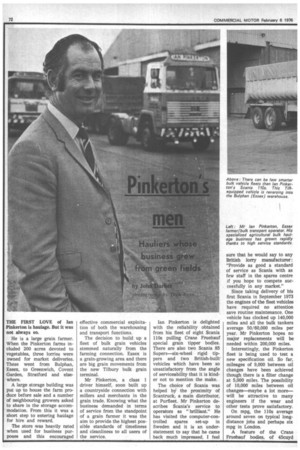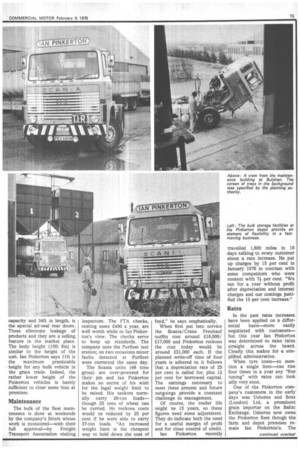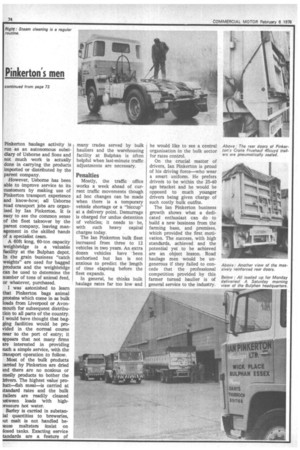THE FIRST LOVE of Ian Pinkerton is haulage. But it was not always so.
Page 74

Page 75

Page 76

If you've noticed an error in this article please click here to report it so we can fix it.
He is a large grain farmer. When the Pinkerton farms included 200 acres devoted to vegetables, three lorries were owned for market deliveries. These went from Bulphan, Essex, to Greenwich, Covent Garden, Stratford and elsewhere.
A large storage building was put up to house the farm produce before sale and a number of neighbouring growers asked to share in the storage accommodation. From this it was a short step to entering .haulage for hire and reward.
The store was heavily rated when used for business purposes and this encouraged effective commercial exploitation of both the warehousing and transport functions.
The decision to build up a fleet of bulk grain vehicles stemmed naturally from the farming connection. Essex is a grain-growing area and there are big grain movements from the new Tilbury bulk grain terminal.
Mr Pinkerton, a class 1 driver himself, soon built up a countryside connection with millers and merchants in the grain trade. Knowing what the business demanded in terms of service from the standpoint of a grain farmer it was the aim to provide the highest possible standards of timeliness and cleanliness to all users of the service. Ian Pinkerton is delighted with the reliability obtained from his fleet of eight Scania 110s pulling Crane Fruehauf special grain tipper bodies. There are also two Scania 85 Supers—six-wheel rigid tippers and two British-built vehicles which have been so unsatisfactory from the angle of serviceability that it is kinder not to mention the make.
The choice of Scania was helped by the proximity of Scantruck, a main distributor, at Purfleet. Mr Pinkerton describes Scania's service to operators •as " He has visited the computer-controlled spares set-up in Sweden and it is an understatement to say that he came back much impressed. I feel sure that he would say to any British lorry manufacturer : "Provide as good a standard of service as Scania with as few Staff in the spares centre if you hope to compete successfully in any market."
Since taking delivery of his first Scania in September 1973 the engines of the fleet vehicles have required no attention save routine maintenance. One vehicle has clocked up 140,000 miles and all the bulk tankers average 50/60,000 miles per year. Mr Pinkerton hopes no major replacements will be needed within 200,000 miles.
Interestingly, the Pinkerton fleet is being used to test a new specification oil. So far, mileages of 9,000 between oil changes have been achieved though there is a filter change at 5,000 miles. The possibility of 10,000 miles between oil changes—maybe a lot more— will be attractive to many engineers if the wear and other tests prove satisfactory.
On mpg, the 110s average around seven on typical longdistance jobs and perhaps six mpg in London, A feature of the Crane Fruehauf bodies, of 45cuyd capacity and 34ft in length, is the special air-seal rear doors. These eliminate leakage of products and they are a selling feature in the market place. The body height (10ft 8in) is similar to the height of the unit. Ian Pinkerton says lift is the maximum practicable height for any bulk vehicle in the grain trade. Indeed, the rather lower height of the Pinkerton vehicles •is barely sufficient to clear some bins at premises.
Maintenance
The bulk of the fleet maintenance is done at weekends by the company's fitters whose work is monitored—with their full approval—by Freight Transport Association visiting inspectors. The FTA checks, costing some £400 a year, are well worth while in Ian Pinkerton's view. The checks serve to keep up standards. The company uses the Purfieet test station; on two occasions minor faults detected at Purfleet were corrected the same day.
The Scania units (48 tons gross) are over-powered for their job and Ian Pinkerton makes no secret of his wish for the legal weight limit to be raised. His tankers normally carry 20-ton loads— though 25 tons of wheat can be carried. He reckons costs would be reduced by 25 per cent if he were able to carry 37-ton loads. "An increased weight limit is the cheapest way to hold down the cost of food," he says emphatically.
When first put into service the Scania/Crane Freuhauf outfits cost around £16,000/ £17,000 and Pinkerton reckons the cost today would be around £21,000 each. If the planned write-off time of four years is adhered to it follows that a depreciation rate of 25 per cent is called for, plus 12 per cent for borrowed capital. The earnings necessary to meet these present and future outgoings provide a constant challenge to management.
Of course, the trailer life might be 15 years, so these figures need some adjustment. They do indicate both the need for a useful margin of profit and for close control of credit.
Ian Pinkerton recently travelled 1,800 miles in 10 days talking to every customer about a rate increase. He put up charges by 15 per cent in January 1976 in contrast with some competitors who were content with 7/ per cent. "We ran for a year without profit after depreciation and interest charges and our coatings justified the 15 per cent increase."
Rates
In the past rates increases ; have been applied on a differential basis—more easily negotiated with customers— but this year Ian Pinkerton was determined to raise rates straight across the board. Clearly this makes for a simplified administration.
When tyre costs—to mention a single item—can rise four times in a year any "finetuning" with rates can look silly very soon.
One of the Pinkerton company's customers in the early days was Usborne and Sons (London) Ltd, a prominent grain importer on the Baltic Exchange.. Usiborne now owns the Pinkerton fleet though the farm and depot premises remain Ian Pinkerton's. The Pinkerton haulage activity is run as an autonomous subsidiary of Usborne and Sons and not much work 'is actually done in carrying the products imported or distributed by the parent company.
However, Usborne has been able to improve service to its customers by making use of Pinkerton transport experience and know-how; all Usborne road transport jobs are organised by Ian Pinkerton. It is easy to see the common sense of the fleet takeover by the parent company, leaving management in the skilled hands of a specialist team.
A 6Oft long, 60-ton capacity weighbridge is a valuable facility at the Bulphan depot. In the grain business "catch weights" are used for bagged products and the weighbridge can be used to determine the number of tons of animal feed, or whatever, purchased.
I was astonished to learn that Pinkerton bags animal proteins which come in as bulk loads from Liverpool or Avonmouth for subsequent distribution to all parts of the country. I would have thought that bagging facilities would be provided in the normal course near to the port of entry; it appears that not many firms are interested in providing ;uch a simple service, with the xansport operation to follow.
Most of the bulk products :.arried by Pinkerton are dried Ind there are no noxious or mielly products to bother the /rivers. The highest value proluct—fish meal—is carried at tandard rates and the bulk milers are readily cleaned )etween loads with highwessure hot water.
Barley is carried in substanial quantities to breweries, )ut malt is not handled beatm maltsters insist on dosed tanks. Exacting service tandards are a feature of many trades served by bulk hauliers and the warehousing facility at Bulphan is often helpful when last-minute traffic adjustments are necessary.
Penalties
Mostly, the traffic office works a week ahead of current traffic movements though ad hoc changes can be made when there is a temporary vehicle shortage or a "hiccup" at a delivery point. Demurrage is charged for undue detention of vehicles; it needs to be, with such heavy capital charges today.
The Ian Pinkerton bulk fleet increased from three to 12 vehicles in two years. An extra dozen vehicles have been authorised but tan is not anxious to predict the length of time elapsing before the fleet expands.
In general, he thinks bulk haulage rates far too low and he would like to see a central organisation 'in the bulk sector for rates control.
On the crucial matter of drivers, Ian Pinkerton is proud of his driving force—who wear a smart uniform. He prefers drivers to be within the 25-40 age bracket and he would be opposed to much younger drivers being given charge of such costly bulk outfits.
The Ian Pinkerton business growth shows what a dedicated enthusiast can do to build a new business from the farming base, and premises, which provided the first motivation. The success, with high standards, achieved and the potential yet to be achieved are an object lesson. Road haulage men would be ungenerous if they failed to concede that the professional competition provided by this farmer turned haulier is of general service to the industry.
































































































































